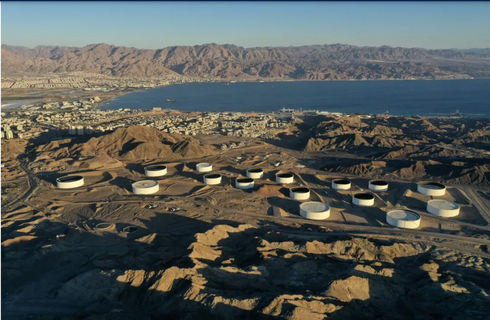Tamar Zandberg, Environment Minister said Thursday that a clandestine deal that would have transformed a paradise for scuba divers into a routepoint for Emirati crude oil headed for Western markets had been effectively blocked.
Zandberg stated to Israeli Army Radio that the agreement could not be realized after a Justice Ministry opinion that her Office had the authority limit the activities of the Israeli government owned corporation that was signed onto the deal.
2


Aerial view (foreground) oil storage container of the Eilat Ashkelon Pipeline Company in the mountains close to Israel’s Red Sea port town of Eilat
(Photo by AFP)
She said that although the deal is on paper, there is no way to make it real. They won’t allow more tankers to enter than the current permit allows. The agreement cannot be realized.
The secret deal would have significantly increased oil tanker docking and unloading at Eilat, an Israeli resort city. It was reached last January between the Europe-Asia Pipeline Company of Israel and MED-RED Land Bridge, a joint Israeli/Emirati venture. This agreement followed the historic diplomatic ties that were established between Israel and United Arab Emirates.
Senior officials from the former Prime Minister Benjamin Netanyahu’s government, including his former foreign and energy ministers, said they didn’t know about the agreement until it was announced last January after the accords were signed by the White House.
Initially hailed as a move to cement fledgling diplomatic relations and further Israels energy ambitions. However, the new Israeli government ordered a review. Following outrage from environmental groups who warned that the increased oil tanker traffic would lead to the destruction of the Gulf of Eilats reefs, the new Israeli government ordered a review. Investors were upset and it could have a diplomatic spat between Israel’s Gulf allies.
The Environmental Protection Ministry stopped the company’s expansion plans, limiting the number of oil tankers allowed into Gulf of Eilat, and effectively preventing the deal.
Israeli environmental groups had requested that the Supreme Court cancel the agreement and halt oil shipment. They cited the corporations questionable safety record, and the risk of supertankers being parked alongside fragile coral ecosystems in Eilats. After the Justice Ministry’s decision not to side with the Environmental Protection Ministry, the groups retracted their lawsuit earlier in the month.
The EAPC was a pipeline company that was established to bring Iranian oil to Israel in the 1960s. Its operations are kept secret ostensibly to protect security.


